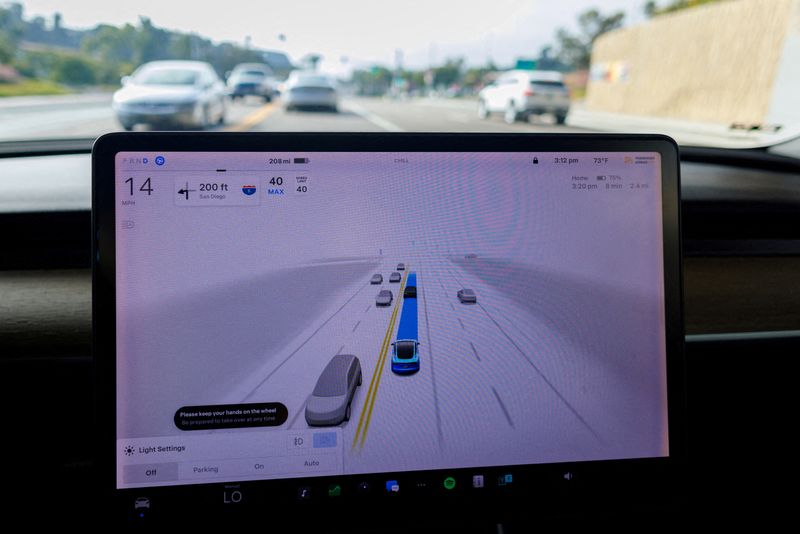SHANGHAI/BEIJING (Reuters) - If Tesla (NASDAQ:TSLA) succeeds in bringing its "Full Self-Driving" system to China, the world's largest car market, the U.S. electric-car pioneer will be shifting into the fast lane of the global race toward autonomous vehicles.
On a whirlwind trip to Beijing starting Sunday, Musk came to discuss the potential rollout of its FSD driver-assistance system and the possibility of securing government approvals for overseas transfers of data from Tesla vehicles in China, according to a source with knowledge of the trip.
Such data, used to train self-driving systems, would boost Tesla's long-term efforts to produce fully autonomous vehicles.
As it did with electric cars, Tesla could prove a fierce competitor in China's autonomous-vehicle segment, industry analysts and executives say, citing its early lead in developing driver-assistance systems with some autonomous features.
But Tesla faces potent rivals including BYD (SZ:002594), China's largest EV maker, and Huawei, a smartphone maker emerging as a national tech champion, that have rolled out systems designed to navigate China's densely packed urban landscapes.
Those two giants are among at least 10 automakers and suppliers that have unveiled driver-assistance systems over the past two years that can navigate city streets and make turns at intersections. Others include EV makers Xpeng (NYSE:XPEV) and Li Auto (NASDAQ:LI), and Xiaomi (OTC:XIACF), the smartphone maker that recently introduced its first car, an instant hit.
Any new model priced at more than $30,000 in China now needs advanced driver-assistance features to compete, said Maxwell Zhou, co-founder of DeepRoute.ai, a China-based startup selling software for advanced driver-assistance systems.
"You must have a high-level driving solution to prove you have a smart car, not a stupid car," Zhou told Reuters.
Xpeng has said it plans to launch a new mass-market brand, Mona, with self-driving features on a car priced below $21,000. That's more than $10,000 cheaper than the China price of Tesla's Model 3.
Many industry experts expect it will take years before fully autonomous cars are commonplace, but predictions vary widely.
Driver-assistance features now offered in China are "level two" systems, meaning they require a driver ready to take over. Tesla's FSD and its less-advanced options of Autopilot, are also level-two systems requiring attentive drivers.
More fully automated vehicle fleets operated by Baidu (NASDAQ:BIDU), China's biggest search engine operator, and Pony.ai, an autonomous driving startup, run in limited test zones.
'CATFISH EFFECT'
Tesla's push to roll out FSD in China would "pressure the other EV startups to accelerate their research and development", said Yale Zhang, managing director at Shanghai-based consultancy Automotive Foresight.
China saw the same dynamic in electric-vehicle development when its government approved Tesla to open a Shanghai plant in 2018. At the time, officials hoped for what they called a "catfish effect" - that dropping a big catfish, Tesla, in the tank would make the other fish, China EV makers, swim faster.
China's industry responded. BYD, the nation's EV leader, has since introduced a slew of models at all price points - starting below $10,000 - as its China EV sales exploded from just over 105,000 in 2018 to more than 1.5 million last year.
Zhang said Tesla's autonomous-vehicle development in China could have the same impact: "It would be the 'catfish effect' for the second half of the game."
'INNOVATIVE AND DISRUPTIVE'
At the Beijing auto show that opened last week, Chinese automakers and suppliers touted "level-two-plus" driver-assistance systems with more advanced sensors and displays. While they are not cleared by regulators for hands-off-the-wheel driving, some are designed to be with future software upgrades.
While Tesla relies only on cameras to detect hazards around self-driving cars, other automakers are rolling out systems that include lidar, which uses pulses of light to detect objects.
Huawei showed off components from telematics receivers that work with both the U.S.-backed GPS system and China’s rival BeiDou satellite system, along with lidar and optical sensors, for advanced driving systems.
The Chinese tech giant aims to compete with other major suppliers of such systems including Bosch and Continental. Bosch welcomes the competition, said Markus Heyn, the Bosch board member who runs the German auto supplier's mobility unit.
"It's good for the market," he said. "We love doing innovative and disruptive stuff."
Tesla could be among the toughest competitors, in part because of its ability to collect data from its vehicles - the world's largest fleet of EVs currently on roads. However, under Beijing's data security rules, it cannot transfer data from its cars in China offshore without approvals.
Musk has pushed for that data to be able to be made available for training its self-driving technology outside China, people familiar with Musk’s discussions with Chinese officials have said. It's not clear what progress, if any, Musk made on data transfers with Chinese officials he visited in Beijing, including Premier Li Qiang.
Musk did leave China with signals that Tesla is closer to delivering FSD in China, which would open a source of new revenue at a time when its EV sales and pricing are under intense pressure from Chinese rivals.
Wins for Tesla from the trip included an endorsement from China's auto industry group that Tesla's best-selling models comply with China's data-privacy regulations and the announcement of a deal with Baidu allowing Tesla to use its mapping license to collect data.

Xpeng Motors CEO He Xiaopeng said in a statement on LinkedIn that a move by Tesla to launch FSD in China could intensify what he predicted would be a decade-long battle for dominance of "smart EVs".
China won't be the only battlefield. It's critical for China's self-driving technology industry, He said, to start "making its mark on international markets outside its own turf."